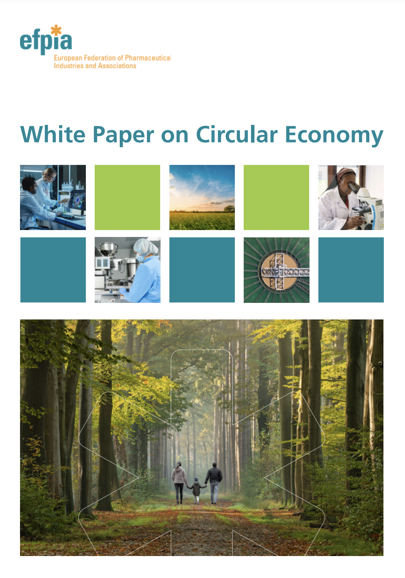White paper on circular economy
Continued adoption of circular economy principles into the pharmaceutical sector can reduce materials extraction and operational waste, contribute to a reduction in greenhouse gas emissions and the regeneration of nature, and safeguard the future supply of medicines essential for patients.
The European Commission’s Circular Economy Action Plan, their Roadmap and the European Green Deal have established direction for the future approach to a sustainable business model based on circularity.
Transitioning to a more circular economy requires changes throughout value chains, from product design, manufacturing and supply, to new business and market models. Designing products for low environmental impacts, identifying new ways of turning waste into resources, prolonging the life of products and changes to consumer behaviour are also important considerations.
EFPIA, the research-based pharmaceutical industry is supportive of the principles of the Circular Economy Action Plan and sees synergies with our aspiration to safeguard the future supply of pharmaceuticals for patients and improve human health. Implementation of a circular economy is fundamental to help limit global warming and we welcome the opportunity to be part of the solution by working collaboratively with the EU in shaping the legislative framework and within our organizations to mitigate our impacts.
The pharmaceutical industry’s approach to circularity builds on efforts to decarbonise the healthcare sector and aligns with the EU’s approach, whilst recognising the constraints, especially on speed of transition, from operating in a highly regulated industry. Due to the regulatory approval process for pharmaceuticals, introducing innovative changes to product manufacturing processes and supply post-approval can take considerable time and present a challenge. Nevertheless, the pharmaceutical industry is actively engaged in driving change in this aspect. Circularity and regulation of pharmaceuticals should be carefully balanced. The innovation to enable circularity will drive new opportunities for growth, promote reduction of the demand for emission-intensive materials and greater resource efficiency, reduce pollutants and create a more competitive economy, but it cannot be done without consideration of wider influences on our activities for example on use of secondary raw materials in manufacturing.
As a significant global market for the pharmaceutical industry, the approach that the EU takes will influence the approach that other countries and jurisdictions take to this issue. It is therefore essential that due care is taken to understand the consequences to extended medicines, vaccines, and therapeutics supply chains both into and out of the EU. Shared sustainability objectives must be reached in a way that continues to safeguard international supply of these vital products.
